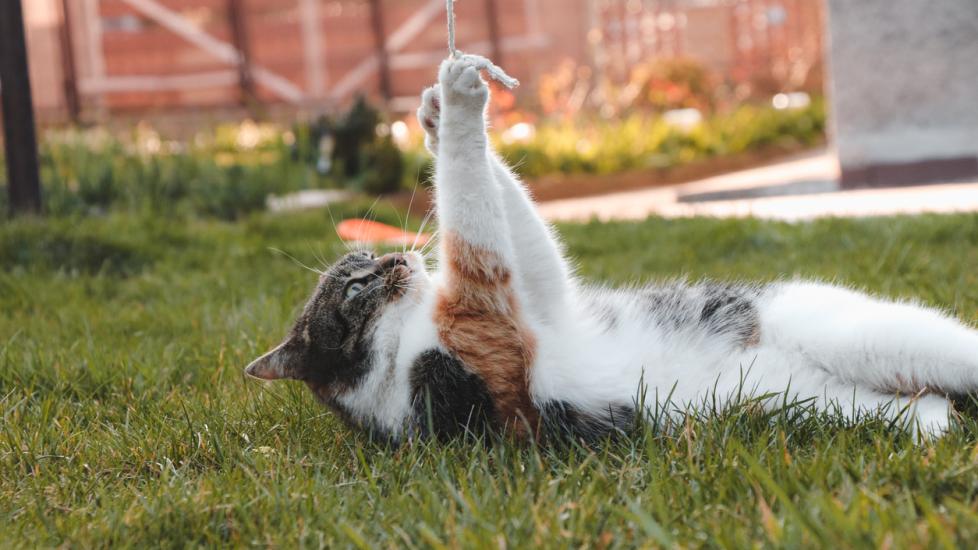What To Do if Your Cat Has Eaten String
If your cat has eaten a piece of string, they need to be seen by their veterinarian immediately.
The sooner a cat is brought to their vet, the better the outcome. While string itself isn’t a toxic material to cats, it can cause a lot of damage within their body and lead to life-threatening complications if proper care isn’t given.
Key Takeaways
- If a cat ingests string, this is considered a medical emergency and they must be brought to a vet immediately.
- String can cause a lot of damage within a cat's body and lead to life-threatening complications.
- Don't induce vomiting and don’t pull the string in your cat’s mouth.
- Cat-proofing your home can help prevent ingestion of string and other dangerous items.
Why Do Cats Eat String?
Cats are naturally adventurous creatures—they find enjoyment in romping around with a ball of yarn or other toys that contain string.
When cats play with one of these items, they mimic hunting prey. Because of this, they usually end up with wads of yarn wrapped around them from all the twisting, turning, and pouncing they do. They may also chew on these items.
Cats may also eat string accidentally when they are chewing on their favorite toy or the edge of a rug. This string can become wrapped around their tongue and become difficult to get out of their mouth and may be swallowed accidentally.
Is It Dangerous if Your Cat Eats String?
Yes—it’s very dangerous for cats to eat string.
If your cat has eaten string, do not induce vomiting. Bring them to a vet or emergency clinic immediately.
Eating string is a serious concern because it has the potential to become stuck in a cat’s stomach or intestines. String can create holes in a cat’s intestines, also called perforation, and cause these organs to scrunch up and become damaged.
This could lead to the leakage of intestinal material into the bloodstream, resulting in a serious bodywide (systemic) infection. If left untreated, these complications can be fatal.
While it may seem that the string is easily accessible just beneath your cat’s tongue, it may have traveled into the stomach or even the intestines.
Don’t pull the string in your cat’s mouth. Pulling the loose end of the string can cause serious damage to their organs.
If your cat has eaten string, do not induce vomiting. Bring them to a vet or emergency clinic immediately.
Can Cats Digest String?
No, cats can't digest string.
String is a fibrous material made of cellulose. Cats don’t have the specific enzymes needed to digest this material.
String may pass through the digestive tract before being excreted in its original form, or it may become lodged in various parts of a cat’s insides.
Signs Your Cat Ate String
Pet parents may not witness their cat eating string, but there are a few telltale signs that something is wrong after they’ve ingested it.
A cat may continually lick their lips or seem to be trying to get something out of their mouth. There may be an obvious piece of string hanging out of the cat’s mouth.
Other symptoms that may appear after string ingestion can include:
-
Diarrhea (which may be very dark or contain blood)
-
Decreased appetite
-
Behavioral changes, such as reactivity or avoidance
When Should You Call Your Vet?
Ingestion of string is considered a medical emergency due to risks of obstruction, tissue damage, and severe infection. Anytime your cat ingests string, call your vet immediately.
Don’t wait for symptoms to start. Your vet can advise you on the next steps, which may include monitoring your cat at home or bringing them into the office for an exam and testing.
Even if your cat ate string a week ago and is otherwise behaving normally, it’s still important to reach out to the vet for advice.
Your vet may be able to retrieve the string by inducing vomiting at the hospital. If the string is not visible during the exam, X-rays and an ultrasound may be performed on your cat to determine the extent of the injury and create the right treatment plan.
Some patients may require endoscopy or surgery and hospitalization.
Your vet can advise you on the next steps, which may include monitoring your cat at home or bringing them into the office for an exam and testing.
How To Prevent Your Cat From Eating String
Pet parents can take meaningful measures to keep their cats safe from ingesting foreign objects like string, ribbon, yarn, or similar items.
First and foremost, cats should never be allowed to play with these items.
If your cat happens to come across string accidentally and begins playing with it, quickly take it away from them.
Some cats may also develop a habit of chewing on the ends of carpet when they are bored. Always cut any loose fibers or frayed edges of carpet and rugs and throw them away promptly.
Having a basket of safe toys specifically designed for cats can help to keep them engaged and reduce the likelihood of them seeking out inappropriate items.
Choose toys that do not contain string. If any of their toys become damaged, they should be immediately thrown away.
Cat-proofing your home may also be helpful. Lock cabinets that contain sewing products, craft supplies, and other hazardous materials.
Don’t keep these items within easy reach of your cat, such as on counters or nightstands.
Keep bathroom closets and drawers that may contain dental floss secured. Make sure your trash can is always covered and not easily accessible to your cat.
Provide your cat with plenty of mental stimulation throughout the day to keep them from getting into inappropriate items out of boredom.
Vertical climbing spaces, puzzle toys, and human interaction are all beneficial to keep your cat safe, happy, and healthy.
Featured Image: iStock.com/VSFP
